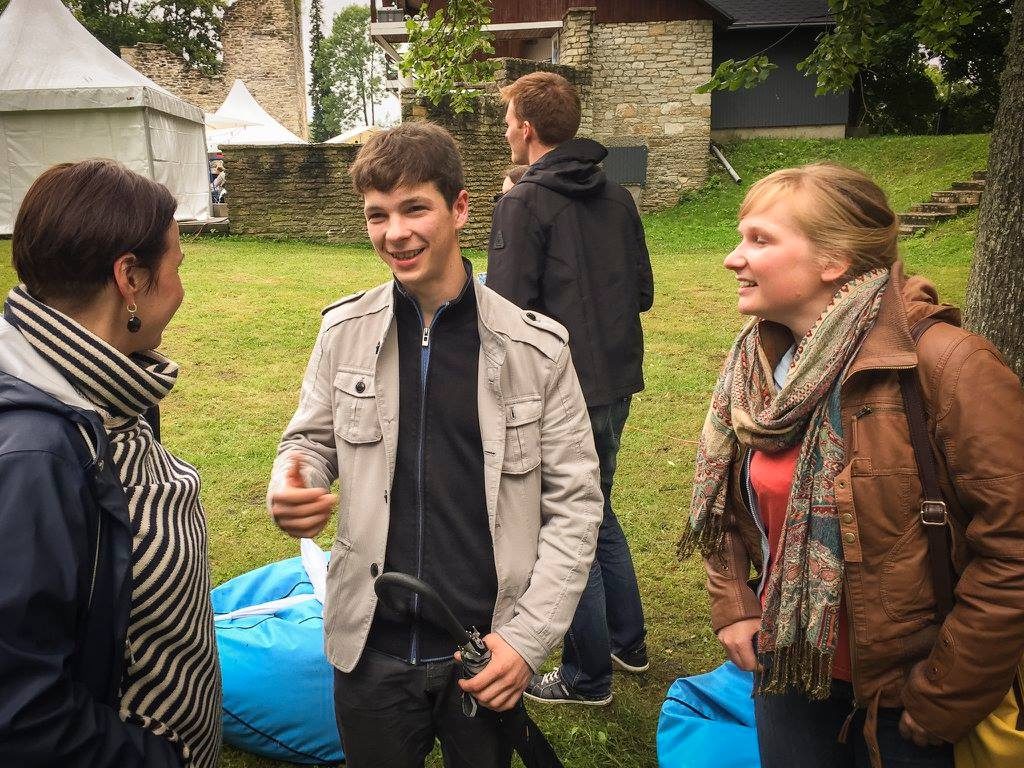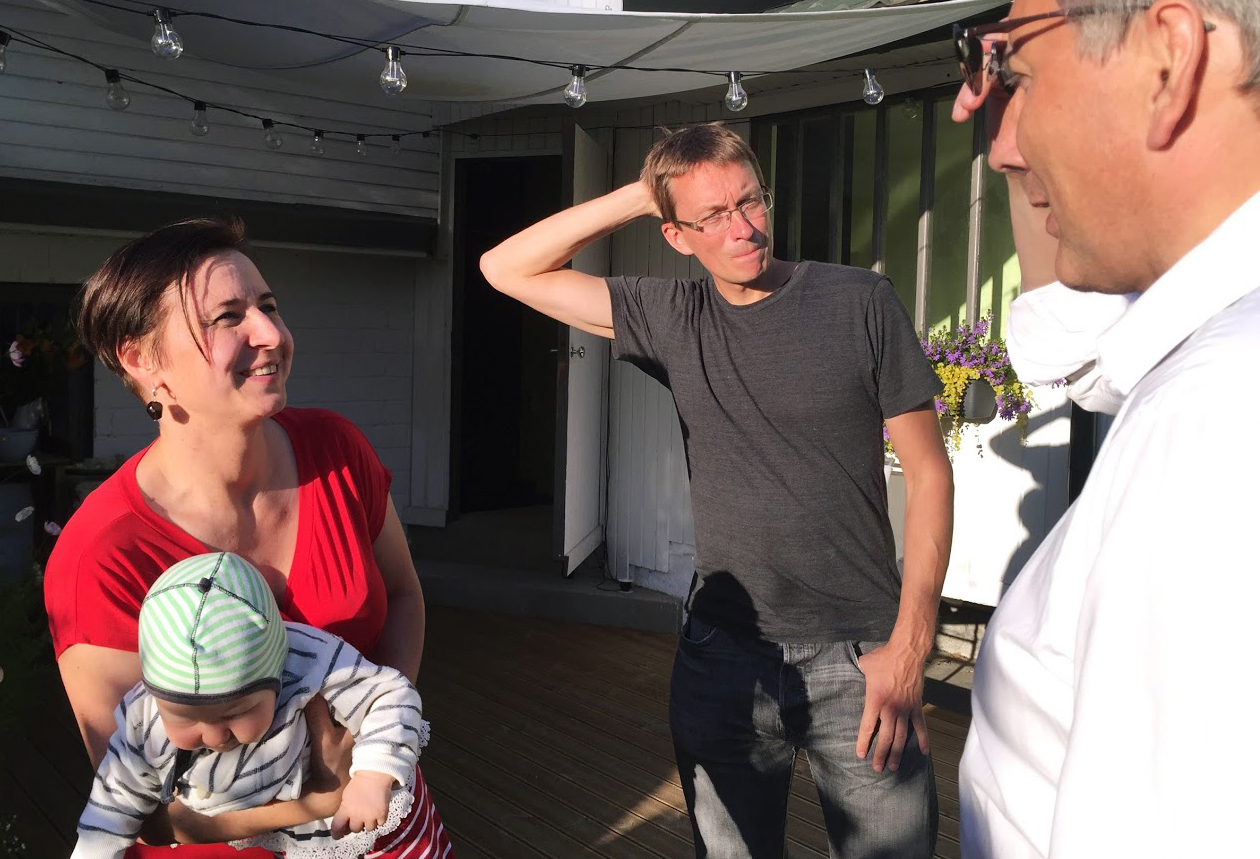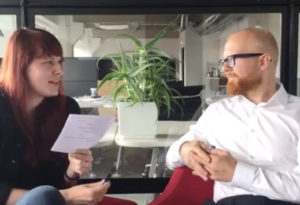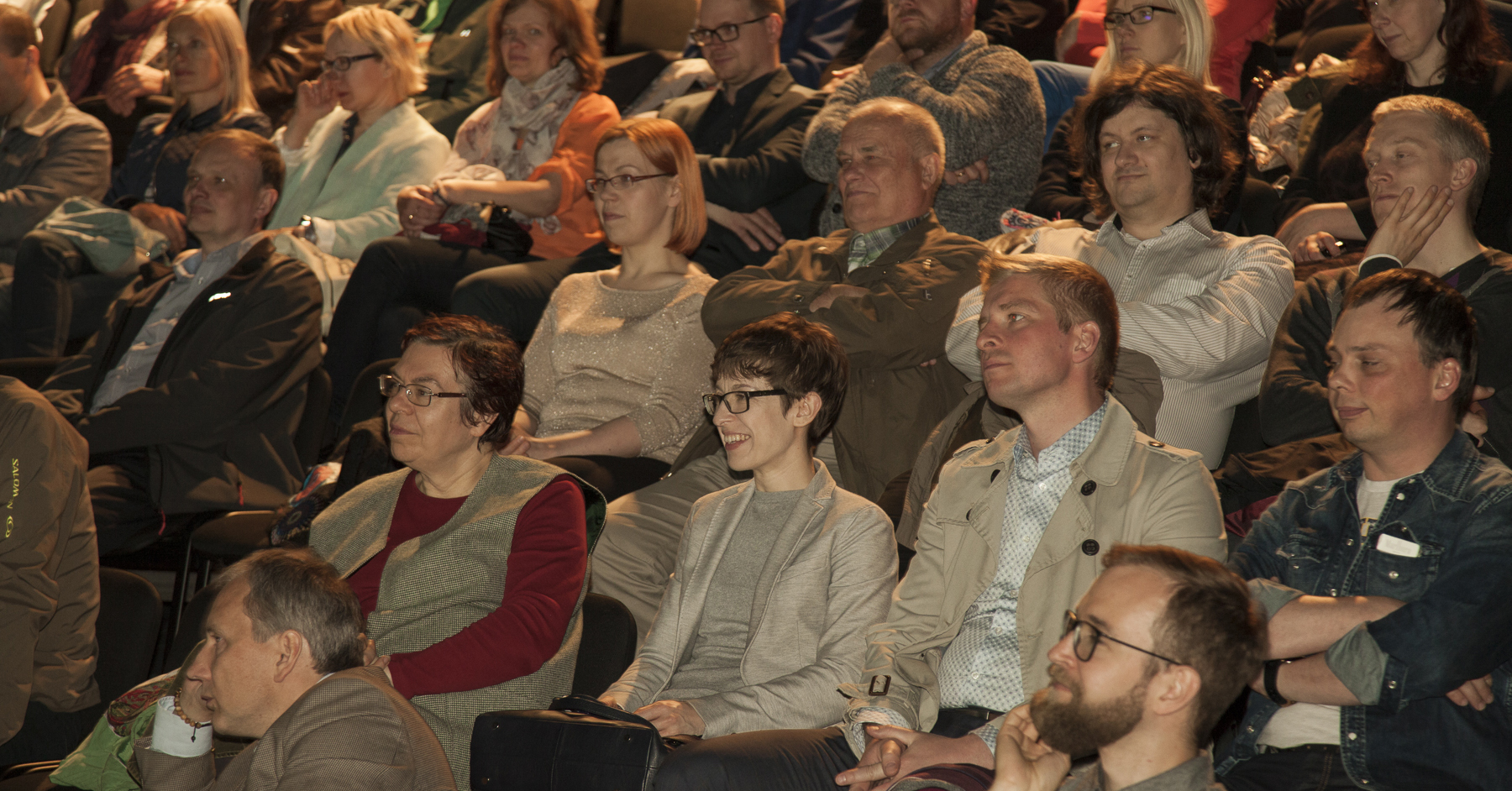A little more than a year ago, on the 12 April 2016, 22 people each contributed EUR 150 and, in the presence of a notary, signed memorandums of association for Tuleva Tulundusühistu. One month ago, we started up Estonia’s most affordable second pillar pension funds.
The time has come to write down the most important notes on the experiences from the first year.
How to break the shield of boredom protecting banks?
We needed a better pension fund; that much was obvious to me. When the state has made contributing to bad funds mandatory instead of avoiding them, then something needs to be done.
Indrek Neivelt was one of the first people to whom I talked to about my idea of creating a better fund. He politely listened to what I had to say, and said, well, so it is; unfortunately, I don’t have the time to help you. However, a few days later, Indrek called me personally. He demanded that we take action immediately. Out of curiosity he had taken a look at his pension account through his Internet bank.
What Indrek saw there was a complete shock to him.
The pension funds of banks are protected by a powerful shield of boredom and complexity.
When we began the search for like-minded people, two reasons quickly became apparent as to why no one had done anything about it for a long time. Firstly, pension funds are not ‘sexy’ and the topic is complicated. Secondly, there is a common myth among Estonians that the amount that will end up being saved in the second pillar will be a minimal at best.
Actually, the pension funds of the second pillar hold the largest share of the savings of Estonians. And year after year, the banks have taken almost one half of people’s returns. The majority of people still don’t know what is going on with their pension accounts.
Today, we have a sufficient number of members and clients to be able to operate sustainably. However, if we had ten times as many people, we could lower our fees even more and even more people would benefit. I don’t want Tuleva to become an elite ‘club for smart people’.
The pension funds of banks are protected by a powerful shield of boredom and complexity. How can we help people to see through it?

Tuleva’s founders, Tõnu Pekk and Priit Lepasepp, at the open air seminar held during Kalamaja Days.
Are we capable of earning the trust of people?
Tuleva’s business model is, in my mind, very simple: people pool their money together and invest it in a reasonable manner, without a middleman. However, we have encountered a lot of scepticism.
Here and there we have read praise stating that Tuleva’s entry onto the market was a very successful marketing trick. If somebody says that you are good at something, then that’s, of course, flattering. But if someone comes and taps you on the shoulder, saying that you sure are ‘selling yourself in a very clever way’, then I feel a little stupid because no one will gain more from the success of Tuleva than its other members. For those people, who are not a part of things as members of Tuleva, it may seem a bit hard to believe.
The doubts are justified – the financial sector is one of the least transparent economic branches and has earned the crisis of trust that follows it around the world. At the same time, a commercial association is not well known form of enterprise. Personally, I believe that as the manner in which technology is developing is making the functioning of a network progressively easier, companies formed as citizens’ initiative’s will also become more commonplace.

A commercial association is, of course, no guarantee of success. What is important is to picture a management structure which would also be sustainable in the long term. One which could not be harmed in the event of a hostile takeover and which does not depend on the enthusiasm of a founder, but would instead set incentives to encourage the team in the right direction.
Banks purchase trust and then sell it back to their clients. Tuleva does not have awe-inspiring headquarters. We cannot reference our 100 years of history. My business plan included an communication budget of EUR 1000 per month – not enough to buy any powerful advertising campaigns.
What is left is the hope that trust can be earned, if things are done with honest intentions and by learning from one’s mistakes. Well over half of the costs of the management companies of banks today are directed towards marketing. Perhaps this is because it costs a lot to sell bad products?
Is Tuleva a start-up or social enterprise?
Well, I have had to repeatedly explain that Tuleva is not a charity or a people’s assembly. Our goal is to earn money for our members.

Tuleva has many typical start-up characteristics. A small and agile team, rapid growth, market shaking effect, etc. However, unlike a typical start-up company, we don’t have any venture capital investors, who are demanding super profits and an exit strategy. Our owners are members themselves, and they want something else: stability and long-term growth for their own assets.
Thus, Tuleva is more of a social enterprise established through a citizen’s initiative. Tuleva’s objective is broader than just benefit for its owners: The performance of the pension assets of the Estonian people will affect the life of current and future generations and the health of the national economy. Our impact on society is already tangible. Even so, when speaking to people, I am left with the impression that Tuleva has somehow been a bit too credible since the beginning, too ‘real,’ to fit under the label of a social enterprise.
We must continue to work together and learn from start-ups and citizens’ initiatives, commercial associations and even banks. We must also learn from our mistakes, and there are still many lessons left to be learned.
How to improve your own communication skills and not whine over the stupidity of people?
Annika, Priit, Daniel and I, believed, quite naively at first, that we would be able to open people’s eyes with the truth. We are now smarter. None of the four of us is able to speak about pension pillars in such a way that it would be understandable to educated people who are not themselves finance specialists. I have also never met anyone else who is able to do so.

Interestingly, the financial literacy of Estonians is among the best in the world. It is not reasonable to expect that it would improve further. Honestly, I wouldn’t want surgeons, architects and teachers to spend even more time on learning the nuances of the world of global finance – this would come at the expense of the development of their own specialty.
Therefore, we ourselves – the service providers – must learn to speak clearly and concisely. The state in turn must take a look at how to simplify the entire pension system, instead of adding complexity with every change.
A system that causes confusion is not an inevitability. This is well-suited for those service providers whose products a well-informed client would not purchase. But for those who care about the Estonian people organising their financial matters more intelligently, the accusations of ignorance levelled at people must end and a start must be made to the process of dealing with their own literacy.
We at Tuleva still have a long road to travel here.
Are management textbooks any help?
In 1990, Hansapank purchased a copy of Goldratt’s The Goal for everyone and all sorts of trainings began to be held on the basis of this 1980’s pop work. I must admit that since that time I have viewed business self-help books with a degree of superficial contempt. My preference is for financial theory and fiction.
Therefore, I had no idea when I started Tuleva what things like agile product development or growth hacking were. I thought that the most important think was an airtight business plan.
One evening, I was enjoying a sauna with Kristo Käärmann at the home of my in-laws. It came up in our conversation that everything that Kristo knows how to do himself, he had already delegated to others long ago. Kristo also said that he would trust the management of certain projects within Transferwise to someone who is doing it for the first time, rather than someone doing it for the umpteenth time.

This got me to thinking.
Men over the age of 40 tend to imagine that we already know everything. Especially when we have ended up in the right place at the right time, and thanks to which we have been lucky in life. You know the type: someone to whom nothing is new. Someone who is always offended that others are not as appreciative of his knowledge as he is himself. These redundant wise guys are horribly tiring and sooner or later will likely find themselves unemployed.
I usually read the Financial Time or the London Review of Books. I put them aside and ordered a few instructional textbooks for beginners: Lean Startup, Agile Project Management, etc. I absorbed the experiences of well-known venture capital and start-up companies. I swallowed my pride and began to ask for advice on a regular basis from Tuleva’s members.
I understood that a big part of what Tuleva can do right is not flashes of brilliant ideas, but instead the consistent copying of things that are working. Business self-help books provide templates. In the end, a template must be filled using one’s own experiences and imagination.
I now believe that alongside works of literature, history, finance, cultural theory, and books to simply pass the time, every tenth book should be a management text book.
How to include Tuleva members in management?
The first self-help text book that I download to my Kindle was, of course, Crowdsourcing for Dummies. Actually, what I really needed was something with a title like ‘crowd-owning for dummies.’
One thing that I hadn’t really thought about previously was building up a company together with several thousand people. Within six months, Tuleva’s number of owners has grown to 3000. Among them are top specialists from different walks of life and, of course, smart people. Money has the least value.
How to make it possible that our members are able to be owners in the best sense of the word? Owners who are up to speed with the performance of their company, require the best work from their managers and give them advice where the owner has the better experience?
Tuleva’s first big seminar, which took place in May of last year, was in some sense a failure. We invited people to a large hall. Three people were on the stage and several hundred were listening.
We divided the costs of the hall rental with Investeerimisklubi, whose event was supposed to start after ours. We spoke about Tuleva’s objectives, discussed the problems with the pension system. Also in attendance was Märten Ross, Deputy Secretary General from the Ministry of Finance, who has always expertly cooperated with Tuleva (regardless of the fact that we are direct in our criticism of the government).
Thirty minutes before the end, people began to ask questions. Just when our new members had gotten warmed up and a real discussion could have begun, we had to bring things to a close. We had promised Investeerimisklubi that we would hand the hall over to them.
That same evening, I came to the realisation that I didn’t want to organise any more stock market shareholder type meetings. Tuleva must not become like one of those companies where investor relations are simply a formality. Tuleva must also not become an opinion club, where the managers and owners enjoy pleasant and important conversations while seated behind a table, and also make all sorts of beautiful plans, the impact of which it is impossible to measure. A better way must be found, in which members can participate in setting and deciding on strategic goals. This needs to be a combination of electronic voting, the meeting of smaller work groups and an annual general meeting, participation in which would provide truly interesting and beneficial information.
How have Tuleva’s thousands of owners helped us build our commercial association so far? For example:
- they have provided us with legal advice, and helped the state to make the law,
- they have helped Tuleva reach other people, to whom Tuleva could definitely be of benefit,
- they have tested Tuleva’s products and given us quick feedback.
- they have trained me from a complete novice into a very good beginner in IT project management,
I and the owners of Tuleva have a whole lot of work left to do. If anyone can recommend a book or other sources, from which I could learn about crowd-based management, I would be very grateful for those recommendations.

Is Estonia’s legal system ready for innovation in the financial sector?
Estonia is a special place. There are so few of us, that it is quite realistic to put our heads together through citizens’ initiatives and think of a way in which to do something in a new form.
My repeated experience is that our politicians and state officials have a sincere wish to make things better. Unfortunately, the voice of banks and insurance undertakings in the making of laws is louder than that of the interests of the people. Sometimes one shortage or another is justified by saying ‘this is how it is done in the rest of the world.’ I believe that this will change. Western countries are learning from their mistakes. A young country has the unique opportunity to learn from the experiences of others.
I don’t believe that the state wants to add barriers to entry into the law, which would make it practically impossible for new players to enter the market. But these barriers do exist. This was definitely one reason why the pension market remained very harmful to people, while also providing convenient stagnation for banks. Some of these barriers have since been removed, but provisions placing new market participants in an unequal position continue to remain in the laws.
The fund management company share capital requirement was lowered from EUR 3 million to EUR 1 million in the new Investment Funds Act. Banks may no longer charge high fees for people exiting funds. These are important improvements.
At the same time, the currently valid Act only allows banks to access the pension register data; thereby giving bank fund management companies a big head start against others. At the insistence of the teller 99% of people select a pension fund at the bank which they are currently visiting. Changing funds is also technically possible on the pension register’s homepage, but there is a fee for doing so and the process is cumbersome – which is likely the reason why only a few people use the opportunity.
The law has assigned the task of maintaining the pension register to a private company – Eesti Väärtpaberikeskuse AS (EVK). In and of itself this is good, since each fund management company does not have to keep separate accounts for pension savers. However, as a monopoly, EVK’s information system is behind the times. Instead of ensuring that people have the opportunity to legally switch funds, the company’s employees continued to search for new excuses as to why they cannot abide by the law.
We did a lot of the development work ourselves, which should really have been the responsibility of the registrar. For months on end, we held negotiations with the registrar and the Ministry of Finance. It is regrettable that a reasonable temporary solution was reached only after the starting up of the Tuleva fund. A lot of people’s time had to be wasted and a complaint against the registrar submitted to the Financial Inspection. All of these troubles were paid for by pension savers.
Hopefully the amendment to the Act, which has already been prepared within the Ministry of Finance, will enter into force soon, which should then make the register available to all fund management companies. A serious audit to assess the capability of the registrar should also be carried out at EVK.
In order to receive permission to manage a pension fund, Tuleva had to establish a subsidiary, public limited company. Why? asked the members of Tuleva. The only good reason I can see is that Estonian law requires it.

Even though an association and a public limited company are equivalent forms of legal entrepreneurship, the Investment Fund Act gives preference to the public limited company. An association is a classical way for people to collectively gather money, invest and insure themselves. Think about it, where does the term ‘mutual fund’ come from.
Even for the Financial Inspectorate the new fund management company’s owner in the form of an association proved to be a tough nut. They had a hard time understanding at first why we were unable to require a personal guarantee from all of the founders. If necessary, the request for a guarantee would have had to have been presented to all of Tuleva’s members, since the founders will never receive more benefit from Tuleva than the other members. It would have been unjust to have asked them to assume a greater risk.
Since our share capital is currently three times the minimum prescribed by law, the Financial Inspectorate was satisfied with our explanation. Additional guarantees are not required of anyone else.
As an association bringing together Estonians, we are able to set goals with longer-term perspectives than companies belonging to venture capitalists or stock market investors. By showing their annual profit they need to prove their potential. We require long-term stable growth and laws which protect future pensioners and their children. We will come straight out and say it, if, in our opinion, something can be done better and we will work together with those who have the same wish. I am very grateful to competent national officials, who have been, and in the future will surely continue to be, open to constructive proposals. Taking place in May is the subsequent roundtable hosted by the Ministry of Finance, to which a representative of the pension gatherers has been invited for the second time.
What happens if banks make even cheaper pension funds?
In the beginning, several people asked me about the banks possibly making even cheaper pension funds. Honestly, this was not something that I was particularly worried about: The goal for the future was that Estonians would be able to save their pension for themselves, not profit for the banks. The way in which we meet this goal is actually not important to our members.
I shared my thoughts with the heads of LHV, prior to the founding of our association, who are my good friends. I spoke to them about how a low cost index fund would provide the fund’s clients with much better results. That people would buy a better fund without an army of salesman – thereby further lowering costs significantly. They understood that, but to them it seemed like a bad plan to bring a good and affordable competitor to the market at the time, which would take a bite out of the market from expensive funds.
In the end, LHV and then Swedbank and SEB ended up following in the wake of Tuleva (even if reluctantly) and making new pension funds that were cheaper than their old pension funds. We thought that there would be no need for us to continue operating. Although it soon became clear that, in actuality, the banks had no plans to actively offer the new funds to clients. The profit margin was too small.
I understand that banks can never place the interests of the client above the interest of the owners to earn a profit. Even so, I am sure that in the near future, the fees of the pension funds of the most vigilant banks will fall drastically. This in turn places pressure on Tuleva funds. To quote Taavet Hinrik, a founder of Tuleva: ‘Banks ask themselves what is the biggest fee they can collect. We ask, what is the lowest fee we can collect. Today we are able to collect a fee that is lower than that of any other fund management company.“
I am convinced that in the long-term perspective, Tuleva has greater potential for our members than simply the second and third pillar pension investments. Realising this potential is a long game.
In the coming months, Tuleva’s team has three priorities:
- To complete Tuleva’s information system, which will ensure that accounting over the assets of members takes place with integrity and efficiently even when we grow big;
- To work towards the goal of more people discovering Tuleva and being able to bring their second pillar pension assets to Estonia’s most affordable pension fund.
- To analyse the opportunities for creating the best voluntary (or III pillar) pension fund and other good, long-term investment products.
